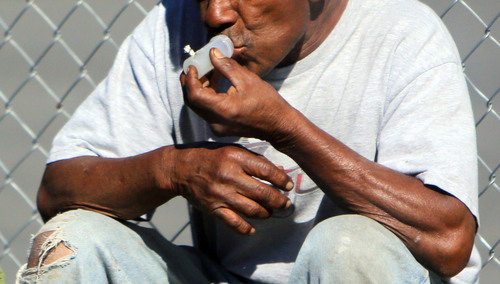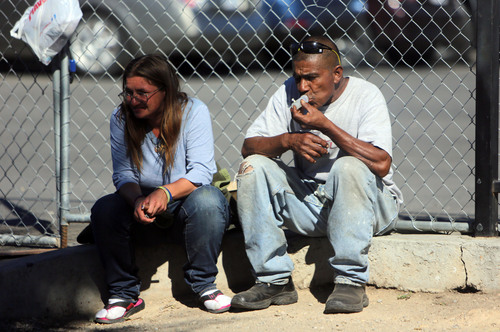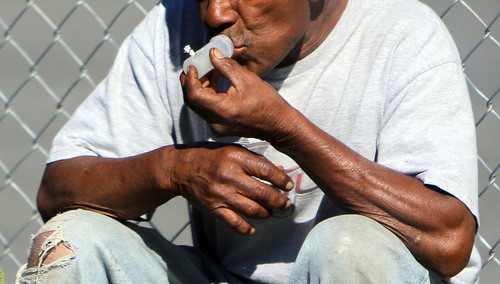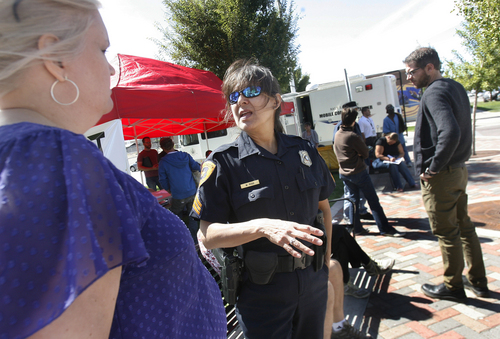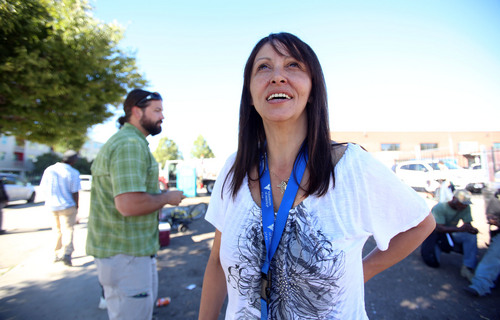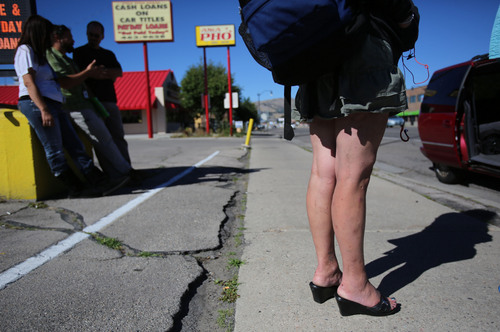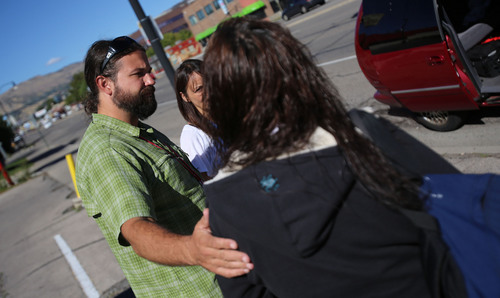This is an archived article that was published on sltrib.com in 2013, and information in the article may be outdated. It is provided only for personal research purposes and may not be reprinted.
In midafternoon, a homeless man toting all his belongings stands in the shade of a tree near the Rio Grande Hotel, a short distance from the homeless shelter in downtown Salt Lake City, and smokes an illegal substance.
"There will always be drugs at the shelter," he says. "When a man gets his hands on 10 or 20 bucks, he's going to spend his money having fun — because he's lost hope."
He won't give his name, but his acquaintances call him Randy. He looks to be about 30 and says his life on the street without a job or much of a future is difficult.
"If I had a roof over my head," he adds, "I wouldn't have these problems."
Professionals who deal with homelessness on a regular basis confirm what Randy says. They caution that not everyone in the homeless population uses street drugs. However, many homeless people suffer from depression, anxiety and other forms of mental illness, as well as physical maladies ranging from tooth decay to bad feet. Illegal street drugs can seem the most convenient way to kill the pain or "self-medicate."
And the flow of illegal drugs through the homeless population from Pioneer Park to 500 West appears to be plentiful. Drug arrests in the area jumped 44.5 percent from 2011 to 2012, according to police department statistics. They account for 22.7 percent of all drug arrests in Salt Lake City.
"It's an open market," says a 55-year-old homeless man, who identified himself as M.S.
"People are exchanging drugs and money out in the open," he says from his perch on a curb along 500 West at about 300 South.
—
Smoking dope • Many along the street on a sunny September afternoon were using drugs in the open, too, M.S. observed. They were smoking crack cocaine, methamphetamine, marijuana and spice — a synthetic form of the chemical in marijuana that creates euphoria.
A Utah State University graduate, M.S. says he lost his job and his marriage to alcohol abuse. But he hopes to land a restaurant job and then get back with his estranged spouse.
"A lot of these people are homeless because of drug use," he says. "They start as kids, getting pills from their parents, and then they leave home and after awhile, they become addicts."
That's among the scenarios homeless advocates see, says Joel Hunt, a physician assistant at the Fourth Street Clinic who does outreach to people on the street.
The homeless population is an ever-changing assortment of people. One segment is made up of folks who fall off the bottom rung of the economic ladder, but eventually climb back to permanent housing and a job. Another segment comprises the chronic homeless who sometimes remain that way for years, according to welfare providers. Many in both groups use illicit substances.
"If you're homeless for any length of time, even if you were mentally fit, depression and anxiety set in," Hunt says. "These folks have pain from a variety of issues, whether it's physical problems ... or voices in their heads. ... They are looking for hope and they will go where they can to get it."
True addicts will do anything to get a fix, he says, including stealing, forging, panhandling or trading sex for drugs.
A 34-year-old woman in a short skirt walking along State Street near 1300 South is living proof of that. She is, by her own admission, a heroin addict who makes money to pay for her addiction through prostitution.
The woman, who refuses to give a name, says she is originally from West Valley City and began using drugs in high school. She became addicted to heroin in her early 20s. She needs to make $50 a day for a room at a small motel, and another $50 for her drug habit. Food and cigarettes are on top of that.
She's been homeless for nine years and plies her trade seven days a week, 365 days a year. It's a hard life and she's uncertain of her future. But, for now, she is unwilling to go into treatment again.
"It hurts too bad to go cold turkey," she says. "And I'm too big of a chickens—-."
—
Out of reach? • There are other programs that provide pharmaceutical treatments. But many of them are underfunded, according to providers, and often too expensive for addicts trying to get clean.
Addiction is a treatable disease, says Jennifer Hyvonen, external affairs director at the Fourth Street Clinic. But treatment requires resources that are in short supply.
"The services are limited and there is a long wait list," she says. "But there are a lot of things we can do to treat substance abuse."
Salt Lake City police Sgt. Michelle Ross seeks to bring programs that are available to the homeless each week. Various providers gather at Pioneer Park or 500 West near 300 South, while Ross attempts to shepherd people to them. Mayor Ralph Becker recently announced that the city would reboot its efforts to offer programs to the homeless.
But it can be a hard sell. Many in the chronic homeless population are distrustful, particularly of police.
Law enforcement will not tolerate criminal activity, Deputy Police Chief Mike Brown says in an interview.
"Dealers target the homeless, specifically," he says. "And the dealers use them as cover" to hold or deal the drugs.
Even though police make hundreds of arrests each year around the shelter, "you can't arrest your way out of this problem," Brown says.
The solution "is to get these people the help they need so they can get off the street."
Nonetheless there seems to be an unending stream of homeless, particularly in a sluggish economy. And as funding shrinks for programs to aid the homeless, their population grows. And with it, the flow of illegal drugs.
"At the end of the day, people are doing something to make the pain go away," Hunt says. "It's a coping mechanism for what they are facing."
csmart@sltrib.com Join us for a Trib Talk
Monday • Jennifer Napier-Pearce at 12:15 p.m. Monday will moderate a live chat about drug use in Pioneer Park with Jennifer Hyvonen, external affairs director at the Fourth Street Clinic; Matt Minkovich, executive director of The Road Home; Lee Dobrowolski, deputy Salt Lake City police chief; and Christopher Smart, Tribune reporter. > sltrib.com


